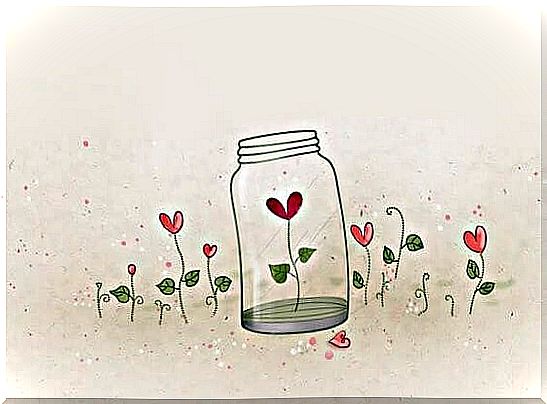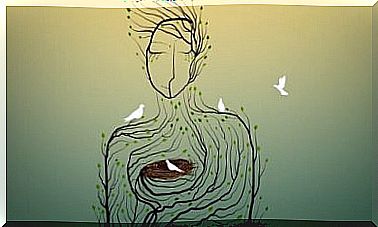Learning To Love In 5 Keys

There is only one happiness in life: “to love and to be loved,” said novelist and playwright Amantine, known under the pseudonym “George Sand.” Under this duality we bond with others not only for what they are but also for what they make us be when we are with them. Now, for love to be linked to happiness we need to love well, from the most complete authenticity. Let’s see how to learn to love.
The word love is widely used in our language. It is associated par excellence with love, one of the most important feelings that human beings experience and that has to do with deep affection, attachment and commitment that one feels for another person.
Loving has multiple conceptions, as many as there are people in the world. But beyond its conception, do we know how to love? Everything seems to indicate that we have some difficulties and even without believing we have them, it is always possible to improve and continue growing in matters of love. Let’s delve into this precious topic.

Do we know how to love?
Almost everyone thinks they know how to love. They believe the feelings they experience are enough and they forget that true love is like maintaining a garden. Day by day you have to water it, eliminate weeds and take care of it so that the flowers continue to grow.
No one is free from the temptations of the comfortable life. However, to love is to protest against them. Discuss important issues with someone you love, set healthy boundaries and promote well-being to apply to common life.
Is love an art? Those who share this conception know that loving requires knowledge and effort. Or perhaps, it is a pleasant sensation, the experience of which is a matter of chance, something that one stumbles upon if one is lucky? The book ” The art of loving “ by Erich Fromm tells us about it. Through it we can discover that love, more than luck – despite the majority of people thinking that it is so – is an art.
It is not that people think that love is unimportant. In reality, we are all thirsty for love. We watch countless movies based on happy and unhappy love stories, we listen to hundreds of trivial songs that talk about love… However, almost no one thinks that you have to learn to love.

How to learn to love?
It seems as if only anything that provides us a tangible benefit such as money or prestige is considered worth learning. But, what happens to what benefits the soul? Is learning to love possible? Does learning what we feel but do not touch benefit us?
In this situation we find ourselves in today’s society, where only because of the title of the article many people will not have stopped to read it, without taking into account that love is the answer to existence. Any theory of love must begin with a theory of man, of human existence.
Love is an activity and as such, it is continuity and does not start. Learning to love is necessary if we want, on the one hand, to fulfill ourselves and cultivate healthy relationships.
So that love is not left alone in the beginning, we give you these 5 keys taken from the book “The art of loving” by Erich Fromm to learn to love:
- Be original. We live in the false illusion of believing ourselves to be original in a completely homogeneous world. We settle because we think that relationships cannot be otherwise. However, we have the power to create our own type of relationship from sincerity and authenticity with our partner. In this way, we free ourselves from the conditioning and customs that accompany the “perfect couple” and romantic ideals.
- Find someone who gives everything and do the same. To love is to give. An experience full of vitality, strength and power that fills us with joy. As long as the limits are not exceeded and we preserve our dignity and respect. If we also choose someone who shares this perspective, it will be wonderful because we will exchange the best of ourselves.
- Wanting to know the other. We know each other but we don’t know each other, Fromm would say. We think we know others but we don’t, at least not totally. Every experience we live influences us in some way. Change is the only constant. Keeping the flame of meeting our partner alive is the breath of non-routine.
- Distinguish the type of love that we are willing to give and receive. There are many types of love. Knowing which one we can offer and receive will influence our relationship. Now there is nothing compared to mature and conscious love. That must be our end. Two beings that become one but remain two.
- Accept the challenges and conflicts of the couple. Love is not the absence of conflict, but a constant challenge in which to grow and work together.

There is only one remedy for love: love more. Far from being discouraged, when we suffer a love disappointment it is necessary to look to the future with a new vision of life, instead of shutting ourselves up in our lair.
Loving is an art, a process where creativity, care and authenticity bear fruit, as long as we are willing to give from respect and responsibility. Loving more is the remedy for any problem in life …
Buddhist love
From Buddhism , love is the desire and aspiration that all beings be happy and have the causes of happiness. The reference to all beings includes from loved ones, neutrals and even our biggest “rivals”. From this perspective, love does not expect anything in return, not even a “thank you.” As His Holiness the Dalai Lama says, when we slap one hand, the other automatically strokes it to calm it without thanking us. So it should happen with love. When someone suffers, we come to their aid.
Here comes another factor, compassion, in this case it is the desire and aspiration that all beings free themselves from suffering and its causes. These two aspects are key in Buddhism to learn to love, since they represent the purest love.
However, we are not to confuse love and compassion with giving everything. Sometimes the purest love is giving a wake-up call to someone we know is on the wrong path. For example, if a friend who takes refuge in alcohol asks us for money to buy more, the most successful act of love would be to take care of his health and not provide that money.
Since Buddhism love is free of attachments. Nothing is expected in return. The more you give, the better, the more love grows. That is, there is a belief that if we give love, in some way, it is spent. Buddhism tells us the opposite, love grows as it is offered. So love does not have a specific face, but encompasses all beings.









